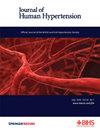血管紧张素转换酶抑制剂:控制与认知处理速度延迟有关的血压的治疗选择。
IF 2.7
4区 医学
Q2 PERIPHERAL VASCULAR DISEASE
引用次数: 0
摘要
抗高血压治疗(AT)对于预防与高血压相关的认知功能下降至关重要。这项观察性研究的目的是比较非高血压(NH)志愿者和高血压患者的认知能力(CP),并评估 CP 与抗高血压药物(AHD)之间的相关性。研究共分为三组:非高血压志愿者(n = 30)[第 1 组]、收缩压 (SBP)本文章由计算机程序翻译,如有差异,请以英文原文为准。
Angiotensin-converting enzyme inhibitors: a therapeutic option for controlling blood pressure associated with delayed cognitive processing speed
Antihypertensive treatment (AT) is essential for preventing hypertension-related cognitive decline. The goals of this observational study were to compare cognitive performance (CP) between non-hypertensive (NH) volunteers and hypertensive patients and to evaluate the correlation between CP and antihypertensive drugs (AHD). Three groups were constituted: NH (n = 30) [group 1], hypertensive with systolic blood pressure (SBP) < 140 mmHg and diastolic blood pressure (DBP) < 90 mmHg (n = 54) [group 2] and hypertensive with SBP ≥ 140 or DBP ≥ 90 (n = 31) [group 3]. To analyze the cognitive domains, a neuropsychological battery was applied and the raw performance values in these tests were transformed into z-scores. The domain was considered impaired if it presented a z-score below −1.5 SD. Compared to group 1, both groups of hypertensive were older (51 [ ± 12] years) and showed a worse CP in episodic memory (p = 0.014), language (p = 0.003) and processing speed (PS) [p = 0.05]. Angiotensin-converting enzyme inhibitors (ACEi) and angiotensin receptor blockers (ARB) were the most used AHD (46.3%, p = 0.01 [group 2] and 64.5%, p = 0.005 [group 3]) and showed correlations with PS. Linear regression models revealed a negative association of PS with the use of ACEi (β = −0.230, p = 0.004), but not with the use of ARB (β = 0.208, p = 0.008). The effect of AT on cognition appears to go beyond the search for lower blood pressure targets and also includes the mechanism of action of AHD on the brain, so that additional benefits may possibly be achieved with simple adaptations in the treatment regimen, particularly in patients without clinically manifest cognitive impairment.
求助全文
通过发布文献求助,成功后即可免费获取论文全文。
去求助
来源期刊

Journal of Human Hypertension
医学-外周血管病
CiteScore
5.20
自引率
3.70%
发文量
126
审稿时长
6-12 weeks
期刊介绍:
Journal of Human Hypertension is published monthly and is of interest to health care professionals who deal with hypertension (specialists, internists, primary care physicians) and public health workers. We believe that our patients benefit from robust scientific data that are based on well conducted clinical trials. We also believe that basic sciences are the foundations on which we build our knowledge of clinical conditions and their management. Towards this end, although we are primarily a clinical based journal, we also welcome suitable basic sciences studies that promote our understanding of human hypertension.
The journal aims to perform the dual role of increasing knowledge in the field of high blood pressure as well as improving the standard of care of patients. The editors will consider for publication all suitable papers dealing directly or indirectly with clinical aspects of hypertension, including but not limited to epidemiology, pathophysiology, therapeutics and basic sciences involving human subjects or tissues. We also consider papers from all specialties such as ophthalmology, cardiology, nephrology, obstetrics and stroke medicine that deal with the various aspects of hypertension and its complications.
 求助内容:
求助内容: 应助结果提醒方式:
应助结果提醒方式:


